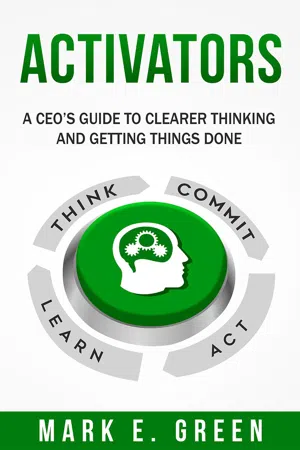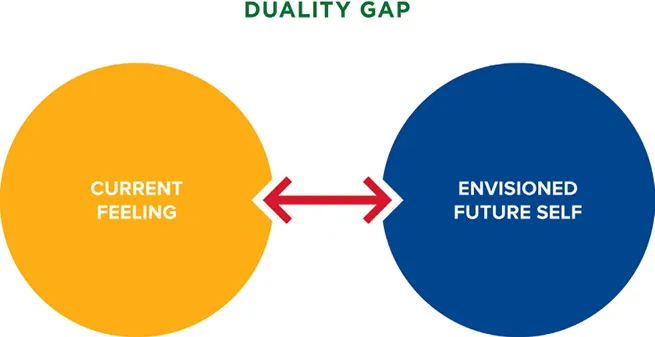![]()
Chapter 1
What Do You Really Want?
(And What Are You Willing to Do about It?)
It was mid-afternoon on a crisp, cool, fall day in the leafy suburb of Chappaqua, New York, just about an hour north of New York City. I grew up there, in a modest 1960s-era four-bedroom split-level—white with blue shutters—at the end of a quiet street. That day, October 10, 2000, the house was filled to the brim with family and friends.
There was a catered spread in the dining room, a buffet stretching from wall to wall. The aroma of Italian food—garlic, freshly baked bread, and sauced pasta—wafted through the house.
People were talking loudly, with their hands. There were aunts, uncles, grandkids, friends new and old—people from all corners of my life. I couldn’t walk three feet without running into someone wanting to check in and catch up. The ebb and flow of conversation made it seem like someone was playing with the volume control; sometimes I couldn’t hear myself think. Other moments were almost too quiet.
We buried my father that morning.
“Can you tell us about your father?” one of my friends asked as we stood near the front door. “What was he like?”
I drew in a breath, thinking about how to respond to what felt like a profound question, especially now that I would be answering in the past tense. But before I could respond, the doorbell rang.
“Excuse me,” I said, turning to answer it.
A man in a UPS uniform was standing outside. He wasn’t toting a package, nor did he have a piece of technology—not even a notepad or a pen.
“Hi,” he said, visibly unsure of what to do with his hands. “I just wanted to let you know that I’m very, very sorry to hear about your father. He was really special.”
I was completely caught off guard. “I . . . thank you,” I stammered.
“He always asked me how I was doing. Invited me in to warm up with a hot cup of coffee in the winter or to cool off with a glass of water in the summer.” The man had been staring at his empty hands, but now he looked me right in the eye. “Nobody does that. Nobody does those things. Your father did those things. It meant a lot.”
I swallowed hard. I shook his hand. I thanked him, then added, “Please come inside and join us. My father would be so happy to know you stopped by.”
He politely declined and went on his way.
As I turned around to face my friends, I realized they had overheard the entire exchange. Tears were running down my face. “That’s who my father was,” I managed to choke out. “That’s what he was like.”
My father gave of himself. He comforted and served others. To his friends, to his family, to the man who delivered his packages, he was known as someone who cared deeply.
That is his legacy.
Each of us has a vision, a sense of what we want to create in this life—of what we want our legacy to be.
Take a minute to close your eyes and think about it. What do you want to contribute? How do you want to be remembered?
Fulfilling your vision and achieving the freedom, abundance, and legacy you desire require that you live your life on your own terms. Whether your goal is to make an impact with an industry-disrupting idea, a far-reaching business model, simple kindness—as my dad did—or all three, the journey is as important as the outcome.
But here’s the problem: the path and the outcomes that we imagine for ourselves form an idealized picture, one that is often inconsistent with where we feel we are right now.
Your ideal self may be a business superhero, a difference maker for people in need, or a CEO building a revolutionary company brick by brick, and yet there are days when you can’t fix a simple problem, or you feel more like an amateur than a fearless leader. Experiences like these throw into question the notion that you have it all together, leaving you with the sense that everything could be falling apart. We all have moments that remind us of the duality of how we envision our future versus where we feel we are in the present:
- You aspire to succeed, yet you feel like a failure.
- You aspire to be cool under pressure, yet you feel a lack of control.
- You aspire to be clear-headed, yet you feel indecisive.
- You aspire to be happy, yet you are full of anxiety and worry.
- You aspire to be an amazing spouse or parent, yet you work too much.
The curated life-illusion of social media fuels the disparity between the aspirational version of ourselves and the person we see in the mirror. No matter what channel you’re looking at—LinkedIn, Twitter, Facebook, Instagram—you’re getting others’ filtered, Photoshopped highlights of the week and likely comparing them to the flubs and false starts that are a natural part of every true achiever’s day-to-day existence.
At its core, this disparity is an issue of integrity, or wholeness. We aim to be one way, and yet we feel another. Because we operate in a culture in which we’ve been conditioned not to admit our very human insecurities—our vulnerability, weakness, and uncertainty—this dissonance is inevitable. Worse, it exacts a toll. Psychologists call the price we pay for this emotional labor.
For instance, if you aspire to be a leading CEO who dominates your field, but you actually feel like a used-car salesman as you scramble to raise funds and build partnerships, getting through a meeting is guaranteed to be draining. And more important, your focus on projecting a superior persona diverts your attention from your interaction with the individual in front of you. It’s exhausting, it’s unsustainable, and it’s certainly not scalable.
The problem is that the person you believe you are today is the one dictating your thoughts, habits, and beliefs—the unconscious forces that affect all of your decisions. That’s the person driving your bus. When you are unsure of yourself and your abilities, you’re likely to head in the wrong direction, often with the wrong people on board.
Consider what it takes to play a competitive sport: hours upon hours of mental and physical training, a good diet, strategy, and discipline. You must make the decisions and plays necessary to win the game.
If...

